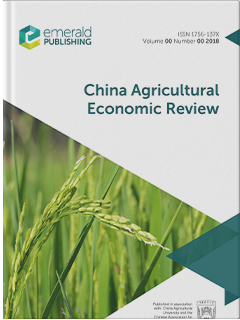中国国内公共库存对世界市场价格的影响——以棉花为例
IF 4.6
2区 经济学
Q1 AGRICULTURAL ECONOMICS & POLICY
引用次数: 0
摘要
目的在世界价格飙升期间,政府更有可能利用贸易扭曲来稳定国内价格,但贸易扭曲会放大国际市场价格的波动。哪种类型的政策可以稳定国内市场价格,但不会扰乱国际市场?本文以贸易政策背景下的公共存储政策为例,回答了这个问题。特别是,本文试图确定国内公共存储对世界市场价格的影响。设计/方法论/方法本文通过纳入国内公共存储政策,扩展了贸易政策的标准理论模型,使该模型在中国的背景下更具适用性。然后将扩展模型应用于分析贸易政策背景下国内公共存储政策如何影响国际市场价格。最后,运用结构向量自回归技术,利用中国棉花数据检验了国内公共储备对世界市场价格的影响。结果表明,中国的公共储备政策能够稳定国际市场价格。为了检验其工作机制,利用2010年至2014年间中国公共库存的飙升来确定中国棉花库存对世界价格波动的影响。实证结果表明,中国通过改变公共库存,能够在不小的程度上稳定国际棉花价格。原创性/价值第一个贡献是,本文扩展了贸易政策的标准理论模型,将国内公共存储政策纳入其中,使我们能够在中国的背景下探索国内公共存储策略对世界价格的影响。第二个主要贡献是,本文提供的证据表明,作为世界市场的一个大参与者,中国的公共储备政策可以在很大程度上稳定国际农产品价格。本文章由计算机程序翻译,如有差异,请以英文原文为准。
The effect of China's domestic public storage on world market prices: the case of cotton
PurposeDuring world price spike periods, the government is more likely to apply trade distortions to stabilize domestic prices, but the trade distortions would amplify fluctuations of international market prices. Which type of policy may stabilize the domestic market price, but not disturb the international market? This paper answers the question by taking public storage policy as a case study in the context of trade policy. Specially, this paper tries to identify the effect of domestic public storage on the world market price.Design/methodology/approachThis article extends a standard theoretical model of trade policy through incorporating domestic public storage policy and makes the model more applicable in the context of China. The extended model is then applied to analysis how domestic public storage policy affects the international market price in the context of trade policy. Finally, a properly identified structural vector auto-regression technique is applied to test the effect of domestic public storage on the world market price by using cotton data from China.FindingsThe theoretical model indicates that China's public storage policy could stabilize the international market price. In order to test the working mechanisms, China's soaring public storage between 2010 and 2014 is employed to identify the effects of China's cotton storage on the volatility of the world price. The empirical findings show that China was able to stabilize the international price of cotton to a non-trivial extent through alteration of its public stockpile.Originality/valueThe first contribution is that this paper extends a standard theoretical model of trade policy to incorporate domestic public storage policy, which enables us to explore the effects of domestic public storage policy on the world price in the context of China. The second major contribution is that this paper provides evidence that, as a large player in the world market, China's public storage policy could stabilize the international agricultural price to a substantial degree.
求助全文
通过发布文献求助,成功后即可免费获取论文全文。
去求助
来源期刊

China Agricultural Economic Review
AGRICULTURAL ECONOMICS & POLICY-
CiteScore
9.80
自引率
5.90%
发文量
41
审稿时长
>12 weeks
期刊介绍:
Published in association with China Agricultural University and the Chinese Association for Agricultural Economics, China Agricultural Economic Review publishes academic writings by international scholars, and particularly encourages empirical work that can be replicated and extended by others; and research articles that employ econometric and statistical hypothesis testing, optimization and simulation models. The journal aims to publish research which can be applied to China’s agricultural and rural policy-making process, the development of the agricultural economics discipline and to developing countries hoping to learn from China’s agricultural and rural development.
 求助内容:
求助内容: 应助结果提醒方式:
应助结果提醒方式:


